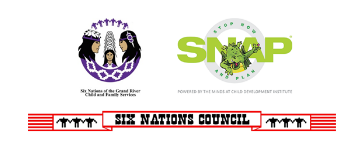Program Profile: SNAP®
By Nicole Schween & Lindsay Craig
Originally published October 2017
History
As part of the Enhanced Ontario Youth Action Plan, the community came together and it was determined that Woodview Mental Health & Autism Services and Six Nations Child & Family Services would jointly submit an application with Six Nations Child & Family Services acting as the lead. The SNAP® Program began servicing clients as of April 2016; SNAP® group delivery is jointly provided by both staff of Woodview and Six Nations Child & Family Services to families in each service area.
Due to the overwhelming success of the SNAP® Program, as a pilot endeavour the SNAP® model is now being delivered within the context of our Elementary Day Treatment Program.
Who We Serve
The SNAP® Program serves boys and girls ages 6-11 who are engaging in aggressive, anti-social behaviour and/or have come into contact with authority figures at school or in the community. Treatment also incorporates skills for siblings and parents/caregivers.


SNAP® Staff
SNAP® Program staff consist of Child and Youth Workers and Social Service Workers who have received extensive training in the SNAP® Model by the Child Development Institute. The Elementary Day Treatment also has two Child and Youth Workers as well as a classroom teacher.
Day-In-The-Life
Each day varies depending on whether or not group is running. Groups are offered in Six Nations one evening per week, with groups occurring in Brantford on a second evening. During the 13 weeks, we have 3 groups running at all times – child, sibling and parent/caregiver.
A typical Wednesday, also known as “group day” starts with a team meeting; bringing the team together to update on Agency happenings, review client cases, and in some instances, staff participate in multi- disciplinary team consultations.
Following team time, staff complete individual sessions, phone check-ins or school meetings throughout the day, prior to evening groups.
Prior to group, the team meets again to pre-brief and ensure all materials are prepared, review group delivery and group dynamics.
Groups begin and are 1.5 hours long, with two group sessions occurring back to back. Each group session is prescribed based on the SNAP® model which include check-in/relaxation, introduction and delivery of skill to be learned in that session, model and role play to practice the skill, debrief and home practice.
A standard child and sibling session includes emotion regulation, bullying, stealing, staying out of trouble, how to join in, and keeping problems small. The boys group session #10 also includes a visit to the local police station to build positive relationships with law enforcement.
A standard parent session includes emotion regulation, other parenting skills such as time-outs, effective listening, rewards, effective consequences, and home/school relations.
Once groups are completed, the team debriefs and tidies and heads home to do it all again tomorrow.
Quirky Fact
All group sessions are also videotaped to monitor adherence and competency of program delivery.
Stand Out Memory
A memory that stands out would show the dedication of our staff on a weekend group day when we were short-staffed and had high need clients in our boys group… on this particular day, one of our staff very creatively demonstrated how to role play a group situation, using only himself. This involved this particular staff changing roles and carrying on a situation involving a disagreement on the playground and how to go about using his SNAP® skills.
During group session video review, this particular staff received outstanding marks for sticking to it despite having to play multiple roles in one role play.
Referral Process
To register or make a referral to the program, please contact Contact Brant at (519)758-8228 or Six Nations Child & Family Services at (519)445-0408.

